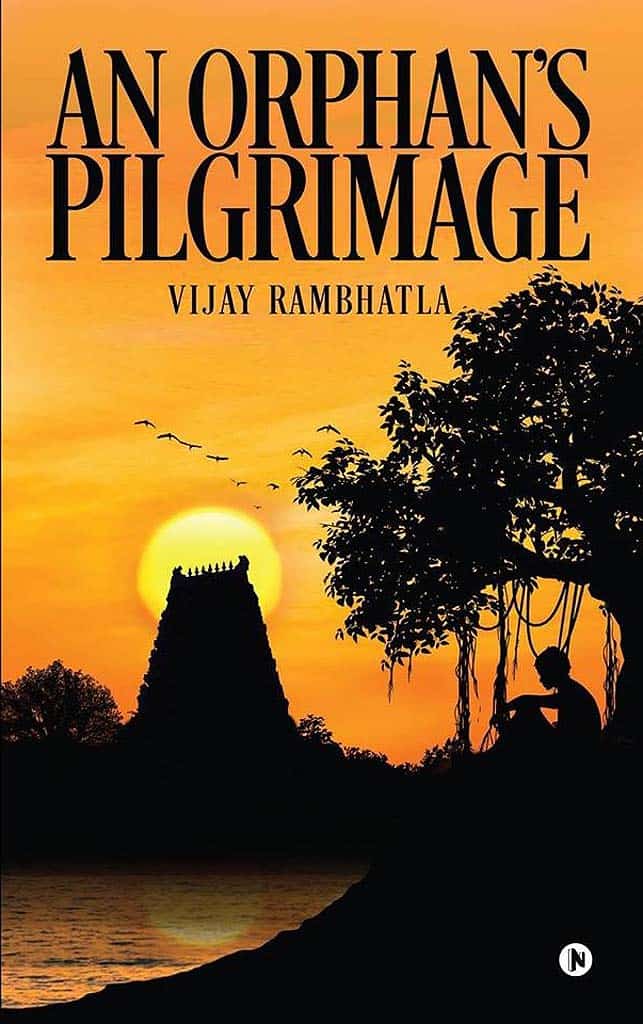CHARACTERS: 4/5
WRITING STYLE: 3.5/5
CLIMAX: 3/5
ENTERTAINMENT: 3/5
If you’re an avid reader, you must have developed a favourite genre.
Maybe you like the sound of the blood pumping in your ears when you read a murder mystery, or perhaps you have more of a penchant for laying in the grass in your backyard and living the lives of your favourite Chick-Lit protagonists.
It’s almost magical, how a passion for words can be shared across so many different kinds of stories.
But once in a while, you come across some books outside of a genre you prefer and yet, find yourself enjoying it.
“An Orphan’s Pilgrimage” by Vijay Rambhatla is one such book.
It starts with a metaphor that I found quite interesting: [perfectpullquote align=”full” bordertop=”false” cite=”” link=”” color=”” class=”” size=””]“People from all walks of life representing the microcosm of India were rushing between platforms in a bid to find their coaches. You felt like a part of this humdrum and yet at the same time completely aloof from it.”[/perfectpullquote]
The book is full of such little insights and it adds the right value to the right situation.
The plot of “An Orphan’s Pilgrimage” is quite simple: Manohar, the child of a physically and emotionally abusive father, grows up in extremely difficult conditions.
He doesn’t have a normal childhood, nor the fortune of sharing it with his family. He blames his father for ruining his and his mother’s life, and has thus grown up with one ambition: when he’s strong enough, he will find his father and take revenge.
Throughout the book, the author narrates the story of Manohar’s childhood as well as the journey he undertakes to meet his father.
The best thing about the plot is that though it may seem simple, it is laced with twists and turns in every chapter – keeping you hooked.
It starts in the present day, where a grown-up Manohar meets his brother and then commences his journey.
This is immediately followed by the story of Manohar’s family, his birth, and his childhood.
I personally found this a very enticing way to spin the story: the author begins with the climax, but leaves it dangling. You will find yourself restless to reach the end and find out just how the story leads to the scene at the very beginning.
I would say three-fourths of the book talks about Manohar’s childhood, after which it leads to his actions in the present day.
As a reader, I found the part about his childhood slightly stretched. It seemed like Manohar’s agony just went on and on – and though I sympathized with him after I point I just wanted the author to get to the ending where it all ties together.
In his writing, Vijay Rambhatla knows how to build a connection. The language isn’t flowered or complex. It’s simple, direct and keeps you engaged.
If you think a simple style of writing won’t build to an exciting book (and you’re right, in some cases it doesn’t), then Vijay proves you wrong with “An Orphan’s Pilgrimage”.
You will grow to love and respect Manohar’s mother, you will find yourself aching when she has to bear the brunt of her husband and mother-in-law’s anger.
When the book moves on to the life of Manohar, you will find immensely involved with it. The style of writing leaves you no choice but to do so.
The writing reminded me of a lot of Sudha Murty’s peaceful, soothing style.
The way Sudha Murty spins amazing stories with her calm words is an art that I admire and enjoy alike.
The author, Vijay Rambhatla has somewhat mastered the same art. It certainly made reading this book a much better experience for me!
If you usually prefer a fast-moving, action-packed story, then I’m afraid “An Orphan’s Pilgrimage” won’t be the best choice for you.
Based more on emotion than pace, the book focuses on action in terms of everything that Manohar has to suffer throughout his childhood.
I won’t spoil the ending, but I will mention that it certainly comes about as a surprise.
Even if you find yourself getting slightly bored or feeling that Manohar’s story is stretching itself out, I assure you that the ending is worth getting through the slightly dragged parts.
The ending might move you and you may love it or you may end up being slightly surprised.
The fact that a single book, a single style of writing and a single ending can induce different emotions in so many of us is only a testament to how a book, any book – is a piece of art.
“An Orphan’s Pilgrimage” will leave you with the same thought. Quick, engaging, touching – this book is great for a travel read or a light free day’s read.
Can’t wait to read it? Buy your copy at the link below.
